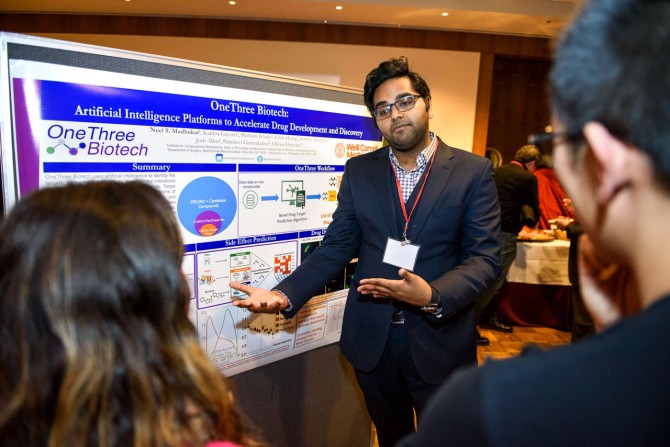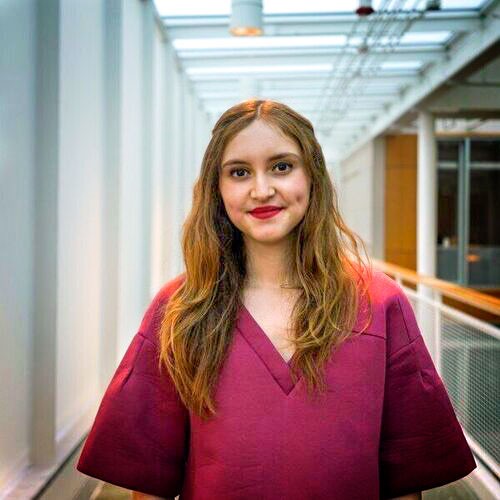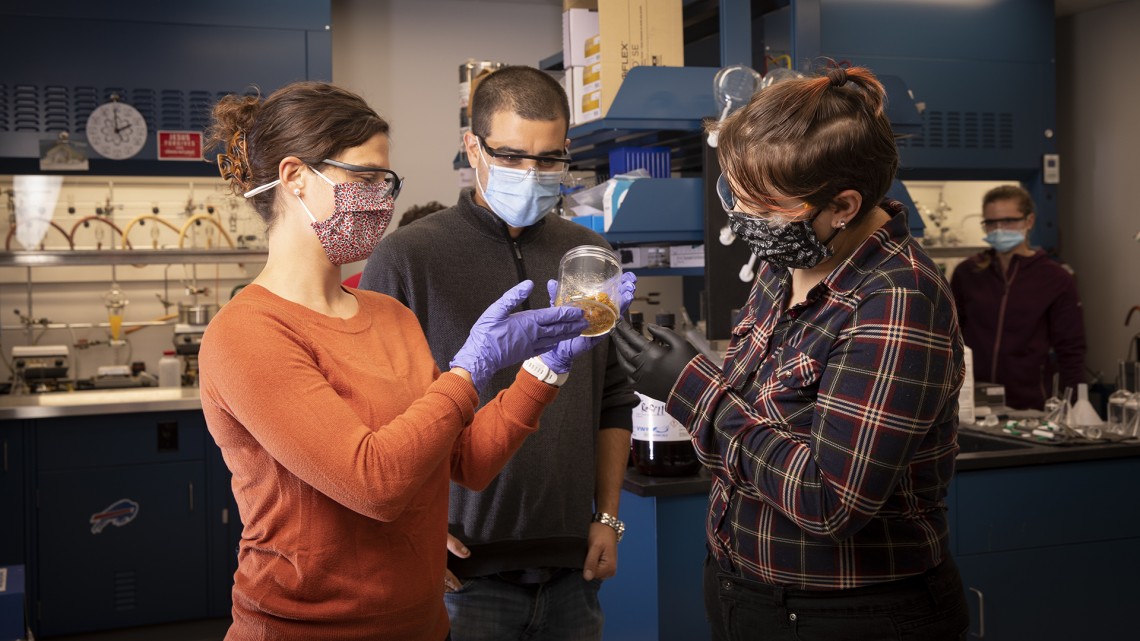
From left, Kristina Hugar, Ph.D. ’15 and Gabriel G. Rodríguez-Calero, M.S. ’12, Ph.D. ’14, co-founders of Ecolectro, and Sarah Nathan, Ph.D. ’18, an analytical chemist with Ecolectro, examine a prototype polymer batch prior to shipping to an industry partner at Ecolectro’s Ithaca headquarters, located off campus.
University’s thriving business incubators, accelerators take off
By Joe Wilensky
As a Ph.D. student at Weill Cornell Graduate School of Medical Sciences, Neel Madhukar had figured out a way to accelerate the discovery of new drugs by modeling biological processes. He did it by harnessing artificial intelligence in the lab of Dr. Olivier Elemento, where Madhukar was focusing on precision medicine and pharmacology.
In the lab, he and Elemento had proved their concept. “Some of the early tests were working pretty well, and we saw a lot of potential for clinical impact,” Madhukar said. “We had hit this moment where we were trying to think about what we could do with it next.”
“We could have done the classic scientific thing where we publish our findings and move on to the next thing,” he recalled, “but we really thought there was an opportunity to build this approach out. So we started looking at ways to fund it.”
Elemento’s lab and Madhukar’s experiments already were beneficiaries of support from Weill Cornell Medicine’s Daedalus Fund for Innovation, a gap-funding program that advances early-stage applied and translational research projects with near-term commercial potential.
Madhukar said he and Elemento at first thought only half-seriously about creating a company.
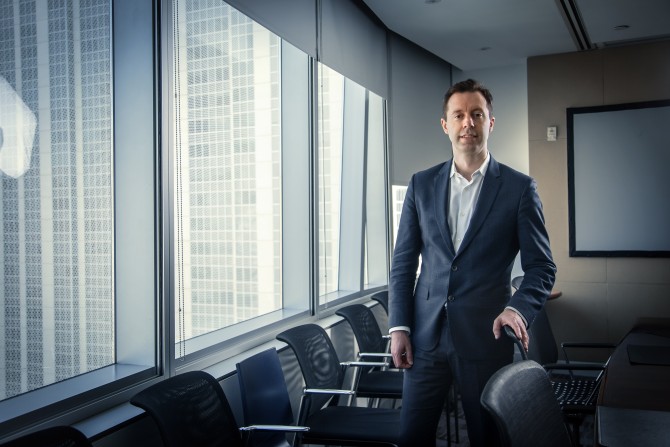
Olivier Elemento, associate professor of physiology and biophysics and associate director of the Institute for Computational Biomedicine at Weill Cornell Medicine.
But they soon discovered that Weill Cornell Medicine’s BioVenture eLab, a recently established hub of the institution’s entrepreneurial system, was launching its inaugural 2017 Business Plan Challenge competition. The 10-week event, designed to help Weill Cornell Medicine clinicians and researchers commercialize their concepts, would culminate with a “Shark Tank”-type contest in which teams compete for a total of $100,000 in prize money.
The BioVenture eLab is just one of many business incubators and accelerators that in the past decade have transformed Cornell University’s campuses into a growing and robust entrepreneurial ecosystem. In a broad, university-wide effort, Cornell’s new-venture catalysts nurture this ecosystem with resources, training and mentorship that help faculty, research staff, graduate students and postdoctoral fellows launch marketable ideas and technologies. The entrepreneurial support system is a vital aspect of the university’s mission to foster economic development within New York state and beyond.
In the past five fiscal years, from 2016-20, 60 new startups were launched with licensed inventions from Center for Technology Licensing at Cornell University (CTL). Of those new ventures, 33 are located in New York state – from Ava Lab and Volastra to Sonder Medicine and Halomine – and 27 are spread across other states and other countries, from Swiftscale Biologics in California to Guard Medical in Paris. During the same timeframe, Cornell University was awarded 564 U.S. patents (and an additional 1,114 international patents), granted 428 commercial licenses and options, and received $88.8 million from the licensees.
This ecosystem includes bigger players, from the relatively new Praxis Center for Venture Development and Weill Cornell Medicine’s Office of Entrepreneurship, established just this year (see related story, this page), to the Kevin M. McGovern Family Center for Venture Development in the Life Sciences. There are many others, from formal incubator programs to student-run spaces and programming, from the the Jacobs Technion-Cornell Institute’s Runway Startup Postdoc program at Cornell Tech to Rev: Ithaca Startup Works, the Cornell eLab, and more (see related story).
“The secret to their success is not just in providing highly subsidized real estate, but in offering mentorship – so that our faculty, staff and students can learn what it takes to start a company, the requirements and the right questions to be asking,” said Emmanuel Giannelis, Cornell’s vice provost for research and vice president for technology transfer, intellectual property and research policy.
“That’s what really has made a huge difference for our entrepreneurs.”
Part of a ‘bigger story about innovation’
Giannelis noted that the university’s entire entrepreneurial ecosystem “is all part of the bigger story about innovation.” And Cornell’s innovation energy has been growing.
Alice Li, Ph.D. ’98, is executive director of Cornell’s Center for Technology Licensing (CTL), the university’s technology transfer office. CTL, a crucial partner in many of these entrepreneurial efforts, works with all of Cornell’s colleges and campuses to catalyze the commercialization of technologies, establish partnerships and form startups. It also often refers would-be clients to the university’s incubator and accelerator programs.
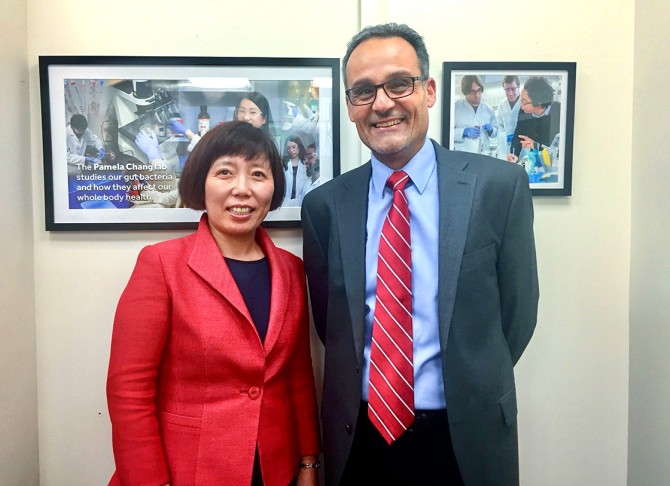
Alice Li, executive directory of Cornell's Center for Technology Licensing, with Emmanuel Giannelis, Cornell's vice provost for research and vice president for technology transfer, intellectual property and research policy.
Every year Cornell is awarded more than 100 U.S. patents and enters into more than 75 licenses and options with industry partners, Li said. In the 2019 Reuters’ ranking of the world’s most innovative universities, Cornell ranked ninth.
Technology startups in particular have been on the rise over the past decade, Li said. CTL has seen an increase from about five startups a year in 2009 to 10 in 2014, and just over a dozen in 2019 and 2020.
And the quality and preparedness of those startups has significantly improved as the university has established its business incubators and accelerator programs, Li said.
“When Cornell entrepreneurs come to us ready for licenses now, they are much more mature and better positioned in terms of team formation, market and product plans, and fundraising,” she said. “Training programs, such as the Commercialization Fellows program in the College of Engineering and the NSF’s I-Corp program, have also helped our inventors at the early stage.”
CTL continues to create new ways to help companies develop. In 2018 it launched its FastTrack Startup License as an experimental program focused primarily on technologies in the physical and engineering sciences, aiming to “streamline the path from lab to startups for those technologies,” Li said.
These efforts also are part of CTL’s comprehensive approach to make the licensing process more transparent and to offer entrepreneurs a straightforward path to use Cornell technologies in commercial settings.
Success can be partially measured by how much money these developing companies raise. Last year alone, Cornell technology startups raised more than $290 million for company growth and product development, Li said.
“Another area we want to grow is the gap funding to translate technologies to reach the next inflection points for new ventures, licensing or business collaboration,” she said, pointing to the Cornell Technology Acceleration and Maturation Fund (CTAM) for the Ithaca and Cornell Tech campuses – similar in scope and strategy to Weill Cornell Medicine’s Daedalus Fund.
“We are constantly engaging strategic partners and individuals to expand its capabilities,” Li said.
This fall, CTAM will evolve to become the IGNITE Cornell Research Gap Funding Program to better support the technology and startup projects. The Peggy J. Koenig ’78 Research Fund was established in November 2019 to support the program, through a commitment by Koenig, a Cornell trustee and member of the Cornell Tech Council.
From eLab to Runway in NYC
In New York City, Madhukar entered his AI-driven drug discovery venture into the BioVenture eLab’s Business Plan Challenge – an event that the eLab’s director, Jahan Ali, described as part of its “catalytic programming.”
The competition helped Madhukar form his company, OneThree Biotech, and taught him how to work with a team of people who weren’t experts in his field, he said. “It taught me to think about how to communicate a very deep computational scientific concept to a noncomputational audience.”
And the competition introduced him to scientists, venture capital firms and pharmaceutical companies who offered insights into their areas of expertise.
“I now had the idea that there really could be a company here, that there really was something to it,” he said. “And it was a Cornell spin-out, the core technology coming from what we developed in the lab. So having that backbone to build off of was very powerful.”
That power carried Madhukar and OneThree Biotech to finish the competition in one of the top spots, sharing in the prize package.
Larry Schlossman is the managing director of BioPharma Alliances & Research Partnerships, which conceived and launched the Bioventure eLab in 2016 and oversees its operations, now under the auspices of the Office of Entrepreneurship. While some other medical schools also run entrepreneurial accelerators, Weill Cornell Medicine’s was one of the first and still stands apart, Schlossman said.
“Ours is explicitly and expressly dedicated to what I call the unique imperatives and the unique skill set and mindset of biomedical entrepreneurship.”
The eLab also offers a flagship 12-week intensive entrepreneurship crash course, the Accelerating Bioventure Innovation (ABI) Initiative. It also hosts workshops in electronics and computational biology, “startup in a box” summer programs, 3D printer training, and regular networking events. Last year, the ABI Initiative attracted 64 participants, including 10 faculty members, as well as 10 students in the executive MBA program.
The eLab also now has a group of full-time entrepreneurs-in-residence with commercial life sciences and startup experience; they work with early-stage Cornell entrepreneurs to help them develop business plans, evaluate the market and pitch to venture capital groups.
“Really what we’re trying to do is create investable companies,” Ali said.
As of 2019, the eLab had catalyzed more than 70 projects, connected more than 65 industry mentors with teams, worked with 33 teams through the accelerator, helped incorporate 5 ventures and hired 4 entrepreneurs-in-residence.
Madhukar went on to postdoctoral studies at Cornell Tech, where he further developed his company, OneThree Biotech, as part of Cornell Tech and the Jacobs Technion-Cornell Institute’s Runway Startup Postdoc program – another powerhouse university incubator that offers specialized guidance and a 12-24 month timeframe to develop recent Ph.D. graduates in digital technology into entrepreneurs.
The program’s generous two-year timeframe meant that it felt like “equal parts scientific innovation, plus it gave you time to think,” he said. “I, as a person, needed to mature into a role of a CEO and I wouldn’t have been able to do that in a three-month timeframe.”
And Madhukar explained that he and his team had to figure out what their business plan was going to be: “Were we going to be a software company, a drug discovery company, or a hybrid? We ended up as some kind of hybrid,” he said.
Madhukar continued working with the BioVenture eLab even after he graduated, noting its efforts and ability to maintain strong connections outside the academic space.
“In a lot of academia, you kind of get caught in the academic bubble. And one thing I loved about working with Jahan and Larry is that, a lot of times when I had questions, they didn’t say ‘here’s the answer.’ They would say, ‘here’s someone from a pharma company,’ or they would connect me with a venture firm or a former CEO who could help me understand the answer. It helped me broaden my network.”
Madhukar and OneThree Biotech ultimately raised more than $2.5 million in early 2020. They are now up to nine employees, and expect to announce pharmaceutical partnerships later this year, with others in the works. The company was recently selected as a finalist of the Reuters Events’ Pharma Awards USA.
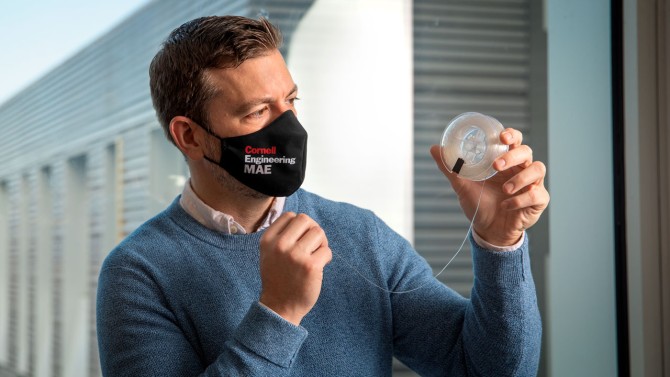
Rob Shepherd, associate professor of mechanical and aerospace engineering, holds a spool of fiber optic cord. Shepherd leads Cornell’s Organic Robotics Lab. Organic Robotics Corporation (ORC), a spin-off company from the lab, creates stretchable fiber optic sensor material used in smart garments.
New, greener approaches to hydrogen production
Networking on the Ithaca campus, other recent graduates are pursuing their startup dreams with Cornell technology, research and scholarship.
Gabriel G. Rodríguez-Calero, M.S. ’12, Ph.D. ’14 (analytical chemistry and materials science), and Kristina M. Hugar, Ph.D. ’15 (organic and polymer chemistry), are co-founders of Ecolectro, a company with a mission to use chemistry to decarbonize the energy, manufacturing and transportation industries and thus fight climate change through its alkaline exchange materials platform. Its core technology, developed in the chemistry and chemical biology labs of professors Héctor D. Abruña and Geoffrey W. Coates, aims to solve the high cost traditionally associated with renewable energy and clean technologies.
“It put us in a really unique position to be able to network with a lot of other really smart people who are trying to take academic curiosities and turn them into products.”
Kristina M. Hugar, Ph.D. ’15, Ecolectro’s chief science officer
“The challenge is that the majority of hydrogen produced today is produced by natural gas, which creates a lot of carbon dioxide,” said Rodríguez-Calero, Ecolectro’s CEO, “and it really doesn’t have to be this way.”
He explained that the century-old process of electrolysis can use renewable electricity and water to create hydrogen as a zero-carbon process. And, while current electrolyzer equipment uses precious metals like iridium, platinum and machined titanium, he said that with the technology Hugar and Coates have pioneered, “what we’ve been able to do is replace a lot of those expensive materials with things like nickel and stainless steel … reaching a cost parity with the current processes of sourcing hydrogen.”
Ecolectro, which was founded in 2015 and launched its lab in January 2016, has developed at the McGovern Center, located in Weill Hall. The center has accepted 22 startups since it was founed in 2011; currently 12 companies occupy its four lab complexes. So far, the center’s past and present clients have raised more than $20 million in federal and state grant support and have raised about $80 million in equity investment – reflecting more than $200 million in shareholder value.
The McGovern Center has “graduated” 10 successful startup companies. The first McGovern graduate, Adapt-N, formerly called Agronomic Technology, was acquired by Yara International in 2017, three years after graduating. Another early graduate, ArcScan Technologies, makes a high-resolution ultrasound ophthalmic instrument used in a variety of ways, including to identify contraindications in patients preparing for Lasik surgery. Bactana entered the center and graduated rapidly, in about eight months. The company develops microbiome strains used by farmers to reduce the use of antibiotics while promoting healthy weight gain in livestock. Current companies, including Zymtronix and Sonder Medicine are moving quickly toward graduation.
“You get assigned a business mentor, you meet with the incubator director, and you can talk through ideas and see what the pluses and minuses are,” Rodríguez-Calero said. And typically, all these business mentors have had past startup experiences.”
The McGovern Center also “put us in a really unique position to be able to network with a lot of other really smart people who are trying to take academic curiosities and turn them into products,” said Hugar, Ecolectro’s chief science officer. “Being a part of that network of people, in different stages of learning and at different levels of experience, has really helped us figure out not only what to do, but what not to do.”
Hugar added that while the McGovern Center offers plenty of formal programming, from weekly meetings to monthly lunches, “a lot of this stuff happens over a cup of coffee in the break room, interfacing with the other entrepreneurs.”
One of the biggest take-aways from the McGovern experience was that simply understanding the science is not enough. “You actually have to talk to your customers and know what your customers want; you have to ask those questions,” she said.
For Ecolectro, that meant that Rodríguez-Calero’s and Hugar’s early focus on fuel cells as a target market ended up not being the best immediate business approach. Accommodating current fuel cell systems to their technology was difficult, Rodríguez-Calero said; instead, targeting the electrolyzer market with a market-ready, drop-in replacement made more sense.
Recently, Ecolectro has pursued federal and state research and development contracts, and they are on the verge of having a pilot production of their product; meanwhile, they have started engaging with large multinational corporations interested in purchasing Eceloectro's advanced membranes for testing, and are also engaged in talks with numerous potential corporate partners interested in bringing them to market.
“We’re right on the verge of having the McGovern Center graduate us and being able to expand a lot of this commercial activity,” Rodríguez-Calero said. “And that’s very exciting for us.”
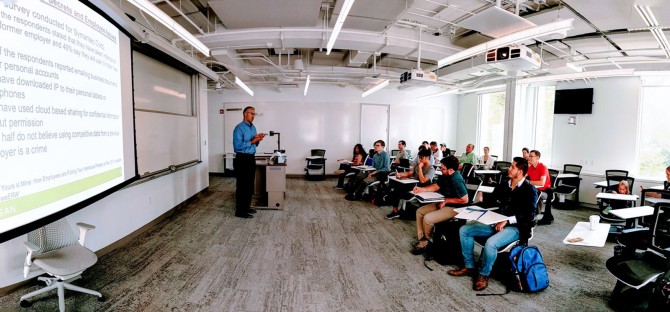
Frank DeCosta, Ph.D. '85, gives a presentation at a Praxis Center for Venture Development event on the Ithaca campus.
First steps for smart material startup
Organic Robotics Corporation (ORC), a spin-off company from Cornell's Organic Robotics Lab, is led by Rob Shepherd, associate professor of mechanical and aerospace engineering.
Ilayda Samilgil ’19, a mechanical engineering graduate who is CEO of the company, is pioneering multiple uses for the lab's patent-pending Light Lace technology. This material is a stretchable fiber optic sensor that can measure pressure and shape change. The combination of this fiber-optic technology in a matrix-type lacework with the elasticity of a wearable fabric is ideal for smart garments that could improve athletic performance and help with injury prevention.
ORC had participated in a regional accelerator program, using optical facilities in Rochester specific to their technology needs. But once their cohort ended there in July 2019, they faced having to find another place or co-working space in which to rent their own space and equipment.
Instead, they were able to join the Praxis Center, which opened in March 2019 in Duffield Hall on the Ithaca campus, funded by Cornell’s Research Division with a focus on giving engineering startups a boost and supporting business development in New York state – in part by attracting more venture capital to the region so that entrepreneurs won’t need to relocate to larger cities or other areas of the country in order to grow.
“The Praxis Center is an element of Cornell’s constantly expanding ecosystem centered on entrepreneurship,” said Robert Scharf ’77, Praxis’ director.
Praxis currently has six admitted venture startups, filling all its available space, and six additional teams are working on their applications, Scharf said, noting that the university is working on expanding the space allocated to Praxis to accommodate its growth needs.
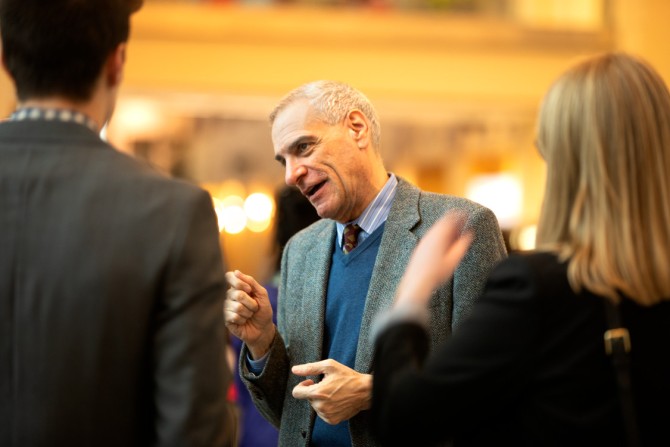
Robert Scharf ’77, director of the Praxis Center for Venture Development, pictured at the formal opening of the center in Duffield Hall in 2019.
Recent Praxis success stories include the microscopic optical scanning technology company OWiC Technologies, which won the annual BenDaniel Venture Challenge in April, and Halomine, an NSF-funded antimicrobial technology company that pivoted earlier this year to target the novel coronavirus.
“The Cornell entrepreneurial ecosystem is thriving despite many challenges, but its underlying vitality attracts attention from many external sources,” Scharf said. He noted that “ironically, the COVID-19 pandemic enhances entrepreneurial opportunities in upstate New York, since geographical location is a much lower priority in our virtual working-from-home, working-from-anywhere environment – advantages previously enjoyed by large coastal cities with hub airports are now inverted. Economic leverage has shifted to small inland cities with lower costs and healthier lifestyle options.”
For ORC, Samilgil said that advisors in the Praxis Center “were able to guide us on what next steps should look like for our company. For example, Launch NY [an upstate venture development nonprofit] was an organization we had not heard of before, but we were advised to explore such opportunities and apply for them. And being in a Cornell incubator also obviously makes it easier for us to work with our student interns so that they have a place to go to and work during school, and can make use of office space or a lab space to work on developments for the company.”
Samilgil said that she, Shepherd and three other recent members of ORC are looking forward to taking the company’s R&D work to the next step at Praxis while simultaneously working on the business development side and seeking mentorship on issues like creating a business plan, which ideas should be prioritized, and what examples are out there that they can learn from.
The company also took advantage of CTL’s Fast Track program and is licensing several Cornell patents for use with their product, taking full advantage of the array of resources positioned to give university-grown and powered ventures their best potential.
“The business incubators at Cornell are firmly rooted in the university’s land-grant mission,” Giannelis said. “With a focus on taking discoveries to the market to solve real-world problems they open doors for students, faculty, staff, and alumni who want to transfer their knowledge and expertise into businesses in New York state and across the globe. They are part of the broader entrepreneurial ecosystem and, as such, they serve a critical role in our strategy to be recognized as a top university in innovation.”
This story originally appeared in the fall 2020 issue of Ezra magazine.
Media Contact
Get Cornell news delivered right to your inbox.
Subscribe




